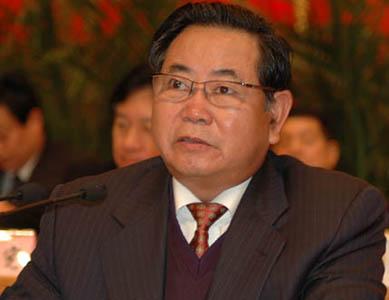Wei Luicheng and Guo Shengkun, have already made their mark on two provinces.
 Wei Luicheng, former president of the China National Offshore Oil Corporation (CNOOC) Limited, was promoted governor of Hainan Province in 2004. On his first day as governor, he told the press that the government planned to repay its debt. This was a signal to the outside world that the government intended to put its finances in order as well as improve the local investment environment. Wei was annoyed by the low efficiency of the bureaucracy and resolved to apply enterprise style management techniques to public service departments. In 2004, he introduced the concept of "executive capacity" in his government work report, an unprecedented move among his peers. The next year, Hainan provincial government issued a regulation giving the governor the right to investigate his subordinates and impose punishment based on their faults. His efforts have had positive effects on the work of government departments.
Wei Luicheng, former president of the China National Offshore Oil Corporation (CNOOC) Limited, was promoted governor of Hainan Province in 2004. On his first day as governor, he told the press that the government planned to repay its debt. This was a signal to the outside world that the government intended to put its finances in order as well as improve the local investment environment. Wei was annoyed by the low efficiency of the bureaucracy and resolved to apply enterprise style management techniques to public service departments. In 2004, he introduced the concept of "executive capacity" in his government work report, an unprecedented move among his peers. The next year, Hainan provincial government issued a regulation giving the governor the right to investigate his subordinates and impose punishment based on their faults. His efforts have had positive effects on the work of government departments.
Guo Shengkun, the former CEO of Chinalco, is renowned for directing large projects. In 2004, Guo was appointed vice secretary of the Party Committee of Guangxi Zhuang Autonomous Region. Many observers believed Guo would use his considerable expertise to build aluminum-rich Guangxi into a heavyweight aluminum producer not only in China but also on a world-scale. They were not disappointed. Guo facilitated the setting up of two multi-billion yuan aluminum plants shortly after taking office. Since then, he has spared no efforts to boost the aluminum industry in Guangxi. In addition, under Guo's leadership, the local government has strengthened its sugar industry by setting up an adjustment mechanism for sugar reserves and stabilizing the sugar-purchasing price. Now, over 60 percent of China's sugar is produced in Guangxi.
In December 2007 Guo was promoted Party secretary of Guangxi, boosting people's confidence in a bright future for the region.
(China.org.cn by Pang Li, March 31, 2008)